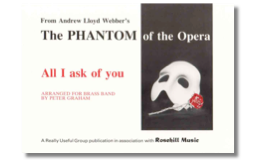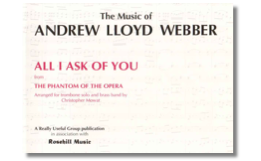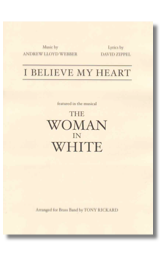Results
-
(I wonder why) You're just in Love - Irving Berlin - Len Jenkins
A great example of the compositional genius of Irving Berlin, with not one but two strong melodies, each independently capable of success, intertwined and used in counterpoint to each other. Good fun! See also 'Play a Simple Melody' also available from Wobbleco Music.
-
 £39.95
£39.95Softly, As I Leave You - Alfred de Vita arr. Alan Catherall
Made popular by many singers over the years, this lovely song was first arranged for the Childs brothers as a solo, and later a duet, by Alan Catherall. It was first performed in the duet version at the Royal Albert Hall, London, in October 1985, conducted by their late father, John Childs. Also available with piano Brass Band Set comprises: Detailed condensed conductor score Solo B-flat Euphonium B-flat Euphonium Duet (2) E-flat Soprano Cornet Solo B-flat Cornet (4) 2nd B-flat Cornet (2) 3rd B-flat Cornet (2) B-flat Flugelhorn* Solo E-flat Horn* 1st E-flat Horn* 2nd E-flat Horn 1st B-flat Baritone 2nd B-flat Baritone 1st B-flat Trombone 2nd B-flat Trombone Bass Trombone B-flat Euphonium (2) E-flat Bass (2) B-flat Bass (2) 1st Percussion 2nd Percussion 3rd Percussion (Drum Kit) * Alternative parts for use as solo or duet provided. There is no Repiano Cornet part.
Estimated dispatch 7-9 working days
-
 £39.95
£39.95All I Ask of You (Score and Parts) - Andrew Lloyd Webber arr. Peter Graham
The official authorized brass band arrangement one of the hit from Andrew Lloyd Webber's The Phantom of the Opera. Arranged by Peter Graham for full band.
Estimated dispatch 7-9 working days
-
 £39.95
£39.95All I Ask of You (Score and Parts) - Andrew Lloyd Webber arr. Chris Mowat
The official authorized brass band arrangement one of the hit from Andrew Lloyd Webber's The Phantom of the Opera. A very sophisticated arrangement by Christopher Mowat for solo trombone and brass band. Lush!
Estimated dispatch 7-9 working days
-
 £39.95
£39.95I Believe My Heart (Score and Parts) - Andrew Lloyd Webber arr. Tony Rickard
The Ofcially Authorised brass band arrangement of this chart success. Tony Rickard's arrangement brilliantly captures the essence of this marvellous song and will make all grades of band sound like champions! What the papers say about The Woman in White... "...return to spectacular form" Sunday Times "A dazzling white hit" Daily Express "Andrew Lloyd Webber's best score in years" Guardian Tony Rickard is a skilled arranger whose work has been played and recorded by The London Trumpet Sound and Canadian Brass. He is the co-author of the highly sucessful Well Easy Trumpet Book.
Estimated dispatch 7-9 working days
-
£33.00
-
£33.00
I Have Nothing - Foster & Thompson - Harper, P
This Oscar nominated song featured in the 1992 American romatic thriller film - The Bodyguard, staring Whitney Houston and Kevin Costner.Described as an 'emotionally charged roller coaster' this song has the dubious honour of being one of the most performed pieces on American Idol!Don't let that put you off, this is a great crowd pleasing number.
In Stock: Estimated dispatch 1-3 working days
-
£40.00
I See The Light - Menken, A - Barry, D
This beautiful song is taken from Pixar's animated feature Tangled. The opening section features the solo horn against a light accompaniment. The music builds to a change of key where the melody moves over to the euphoniums and baritones. This is a useful concert item and playable by all levels of bands.4th section +Duration 3.44 mins
In Stock: Estimated dispatch 1-3 working days
-
£50.00
I Want to Break Free - Deacon, J - Harper, P
Queen's 80s smash hit is known by all and has become an anthem against oppression around the world. The famous keyboard solo is taken by trombone.2nd Section +Duration 3 mins 30 sec Click to listen - Courtesy of Cory Band
In Stock: Estimated dispatch 1-3 working days
-
£25.00
I Want to Break Free (Score) - Deacon, J - Harper, P
Queen's 80s smash hit is known by all and has become an anthem against oppression around the world. The famous keyboard solo is taken by trombone.2nd Section +Duration 3 mins 30 sec Click to listen - Courtesy of Cory Band
In Stock: Estimated dispatch 1-3 working days
